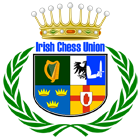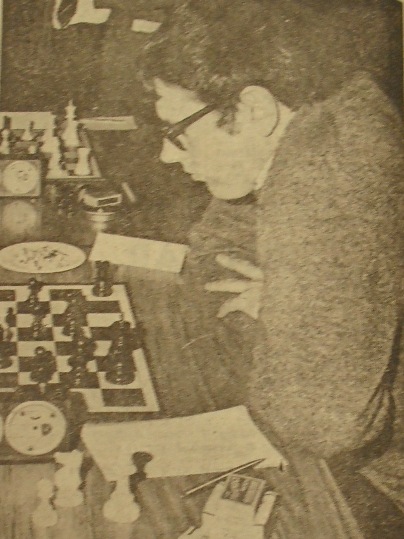School
I learned to play chess when I was about 10 or 11 and I was firmly hooked by the time I was 13. I was already playing in tournaments and club matches, had a subscription to a chess magazine and was beginning to acquire opening books and tournament bulletins. At that time, chess was well organised in schools and clubs in Belfast, thanks to the efforts of a couple of stalwarts called Albert Long and Eddie Thomas. There were therefore plenty of opportunities to play and to improve rapidly. However, the standard of play was not high in Belfast at that time and it did not take long before a group of youngsters, Larry Graham, Gerry McCurdy, the Moles brothers, later Paul Henry, in addition to myself, began to play a significant role in the chess life of the city.
There was no sectarian element in chess and at that time no problem about moving around the city in the evening. In addition to our school and club matches, the young players used to meet at the CIYMS in the centre of Belfast of a Saturday night for chess and snooker. Many of the friendships struck up at that time were later translated into school, student and full internationals.
General Encouragement
No-one else in my family was ever interested in playing chess but my parents always provided all the support I needed for literature, travel and general encouragement. Even nowadays, my family members sometimes bump up against somebody who knows me as "the chessplayer" and I think this gives them some satisfaction. Things were a bit more iffy at school, where I was a founder member of the chess club. Our school concentrated on Gaelic games and for some strange reason, water polo. I think the Brothers were not too keen initially on the idea of some people going off to play Protestant schools. But we persisted and when we won the schools' championship and brought in some prestige, things were different. In one of life's coincidences, I played some minor league games in London in the late 80s; one of my opponents was an old friend from the Imperial College, London, chess club in the late 60s and he had just returned from a teaching stint at my school in Belfast. He told me that the school club and the schools' league were still going.
I played four times in the Glorney Cup, the junior international team tournament, which at my time was confined to England, Scotland, Wales and Ireland. The most exciting one for me was in Dublin in 1963. We began with a draw against Wales and a win over Scotland and sat down against England in the last round. At this point the English had won every match they had played since the tournament started in 1948, a total of 47 matches in a row. At the first time control, we led 3-2 with one game unfinished. This went on for a long, long time and our man, I've forgotten who, finally drew. We had won, beaten England, won the tournament. I seized hold of the Irish captain Paul Cassidy and swung him high into the air.
University
Many of the relations formed at school were cemented when we got to Queens University and the club was arguably as good as any in Ireland in the mid-60s. One initiative was to bring Svetozar Gligoric to Belfast for a simultaneous display in 1965(?), the first time in living memory that a strong player had visited the North of Ireland. I had the satisfaction of beating him with Black in a Taimanov Sicilian.
I played in three Student Olympiads and the one which gave me most pleasure was in Austria in 1968, where I was captain. When we played Brazil, it soon became clear that two Irish players were winning while Eamon Keogh and I were in deep trouble. When I got up from the board after a long think, Eamon told me that he had been approached by the Brazilian captain about the possibilities of a package deal. While we were discussing what to do, we saw both the other Irish players make catastrophic moves, instantly trashing their positions. All four Brazilians were at their boards and their non-playing captain had wandered off to look at some other games. So I told Eamon to clinch the deal and got back to my game. Eamon never missed in that kind of situation and sure enough, a minute or two later all four Brazilians held out their hands with a draw offer. Later that evening, the Brazilians walked into a restaurant where we were eating and if looks could kill ... they had found out. Actually we played quite well overall and for the first time ever in a Student Olympiad, we avoided the bottom group and did quite well in our final group. This included a win over the host country. I was quite pleased with a score of +4 -1 =8.
Olympiads
I played in two full Olympiads, at Skopje 1972 on second board (9/19) and Nice 1974 on first board (10/18). The latter performance was two points short of an IM norm and included a 50% return against eight titled players. I first played in the Irish Championship in Dublin 1962 where I most remember John Reid blowing the smoke of a huge cigar in my face while crushing me in 20 moves, and the man a Guardai too! After that I played regularly and became quite good at coming second. My trouble wes becoming overexcited in the last round and blowing up. Eventually, I overcame this problem and won the Dublin Easter tournament twice and finally the Irish championship in Cork 1973 (see picture above right). I won my first five games, including this one against Coldrick and was well ahead of the field. Then I sat up all night talking and drinking with Michael Littleton (anyone who knows that beguiling man will realise how easy that is to do). The next day I lost to Wolfgang Heidenfeld but was still far enough ahead to run in without too much trouble.
I had quite a successful career at tournament, club and county level in England. In 1972 or 1973, I achieved a BCF grade of 219 (Elo 2352) which placed me 12th in the British ratings. My best memory is playing top board for my club Mushrooms (we had no permanent home but popped up everywhere) in the London League in 1972. We needed to win our last match to win the competition and it came down to 5.5 all with only my adjourned game outstanding against the English international John Carleton. The adjourned position was extremely double-edged and even though I spent an enormous amount of time analysing it, I couldn't decide who was winning or how the game should go. When we resumed, I finally decided to play the most complicated and obscure variation. It turned out that my opponent had done very little analysis, he got into time trouble and went off the rails completely.
Unplanned and Unintentional
After the Nice Olympiad, I played a couple of games against Wales later in 1974 and then no more competitive chess at all. This was unplanned and unintentional; I had fully expected to keep on playing. Round about that time, I was devoting more and more time to political and trade union activity. This is still my main concern. Someone asked me in 1976 if I was available for the Haifa Olympiad and I realised that I hadn't played for 18 months and had no chance of getting any practice in. So I had to say I couldn't play and after that chess very much took a back seat for some years. But about 10 years ago, my interest began to revive again and I have become quite an avid fan. I usually attend the big tournaments in London and was present on the occasion that Kasparov was beaten by the computer at the quickplay tournament. Kasparov's operatic gestures were worth the entry money by themselves.
I have become an addict of computer chess and I like to play against Fritz and Rebel whenever I get the chance. Chess is my main recreation and it will go on being an inexhaustible source of pleasure for ever. But I have resisted the temptation to return to practical play. The ability to calculate variations is not what it was. In the last year I have been delighted to find Chess Ireland [old web Irish chess site now defunct, ed.] on the Internet and to find out what is going on, not least to discover that some of my old friends are still at it.
Positional Style
I had a positional style, mostly opening with 1.d4 and playing the Sicilian and various Indian defences as Black. I was weaker at tactics and had a tendency towards blundering. But at the time I gave up, I was beginning to learn how to carry out an attack on the King and my play was improving remarkably in that respect.
John Moles was the strongest all-round Irish player of my time, though Michael Littleton played many of the most impressive games and Eamon Keogh the most ingenious tactical shots. Wolfgang Heidenfeld was a great mincer of weak opposition. I would say that John Moles, Paul Henry and myself all had the potential to gain an IM title, had we persevered with the game, but we all had other interests and ambitions which turned out to be decisive. It is great to see that we now have two title-holders and that there seems to be quite a number of other players in with a chance. On now to the first Irish grandmaster!

